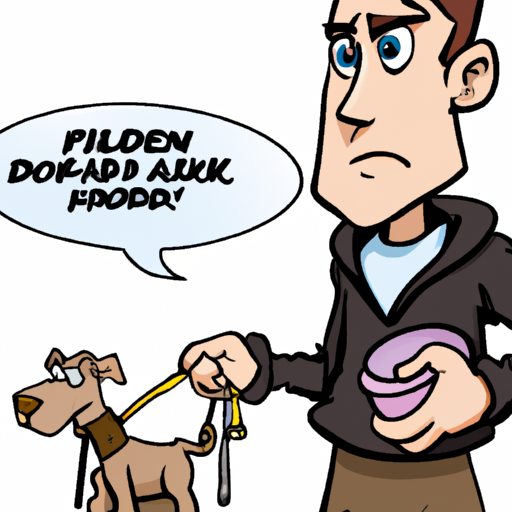As a caregiver, you are always on the lookout for the health and wellbeing of those under your care. One of the most common issues is when dogs throw up. This can lead to a lot of worry and confusion. Is it serious? What should you do? In this article, we will explore this topic in detail, providing you with the knowledge and tools to handle such situations.
1. Understanding Why Dogs Throw Up
Throwing up is a common occurrence in dogs and is often not a cause for alarm. However, it can sometimes indicate a serious health issue. Here are some common reasons why your dog might be throwing up:
- Dietary indiscretion: Dogs are curious creatures and often eat things they shouldn’t. This can upset their stomach and cause vomiting.
- Eating too quickly: If your dog eats its food too quickly, it can cause them to throw up.
- Illness or disease: Certain diseases can cause your dog to throw up, such as kidney or liver disease.
2. Recognizing the Signs and Symptoms
Just like in humans, dogs show certain signs and symptoms when they are about to throw up. As a caregiver, it’s important to recognize these signs so that you can provide the appropriate care. These include:
- Salivating excessively
- Licking their lips
- Swallowing repeatedly
- Heaving or retching
3. What to Do When Your Dog Throws Up
If your dog throws up, it’s important to know what to do. Here is a step-by-step guide:
- Keep calm: It’s important to stay calm so that you can effectively care for your dog.
- Remove the vomit: Clean up the vomit to prevent your dog from eating it again.
- Check the vomit: Look for any signs of blood or foreign objects.
- Monitor your dog: Keep an eye on your dog’s behavior. If they continue to act sick, contact your vet.
4. Preventing Your Dog from Throwing Up
Prevention is always better than cure. Here are some ways you can prevent your dog from throwing up:
- Feed your dog small meals throughout the day: This can help prevent overeating and indigestion.
- Keep a close eye on your dog during walks: This can prevent them from eating something they shouldn’t.
- Regular vet check-ups: Regular vet visits can help catch any potential health issues early.
5. When to Seek Veterinary Help
In some cases, your dog throwing up can indicate a serious health issue. It’s important to know when to seek veterinary help. Here’s a helpful table to guide you:
| Symptom | Action |
|---|---|
| Blood in vomit | Contact your vet immediately |
| Your dog can’t keep down water | Contact your vet immediately |
| Your dog is lethargic or unresponsive | Contact your vet immediately |
| Vomiting persists for more than 24 hours | Contact your vet |
Frequently Asked Questions (FAQs)
Q: How often is it normal for a dog to throw up?
A: It’s normal for dogs to throw up occasionally. However, if it happens frequently, you should consult your vet.
Q: Should I feed my dog after they throw up?
A: It’s usually best to wait a few hours before feeding your dog after they’ve thrown up.
Q: When is throwing up a sign of a serious health issue in dogs?
A: If your dog is throwing up frequently, can’t keep down water, is lethargic, or there’s blood in their vomit, it could indicate a serious health issue and you should contact your vet immediately.
Remember, when dogs throw up, it’s often just a normal part of being a dog. However, as a caregiver, it’s important to know when it could indicate a serious health issue and how to respond. By staying informed and being prepared, you can ensure that your dog remains happy and healthy.



